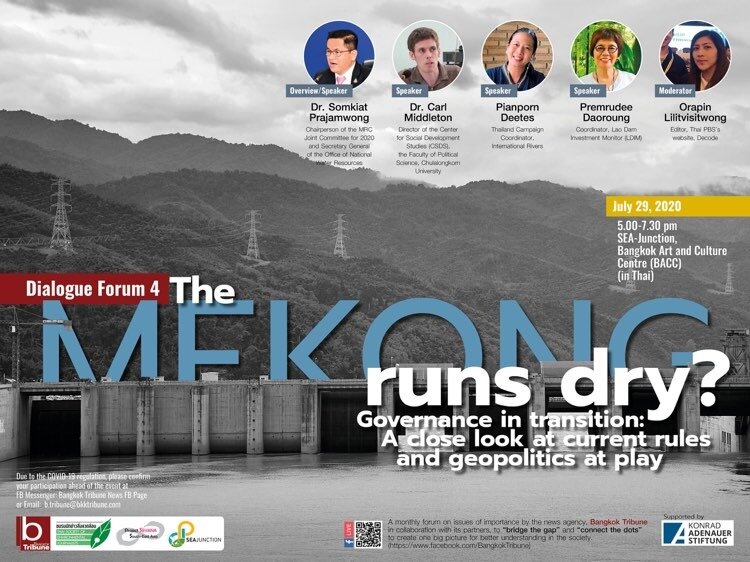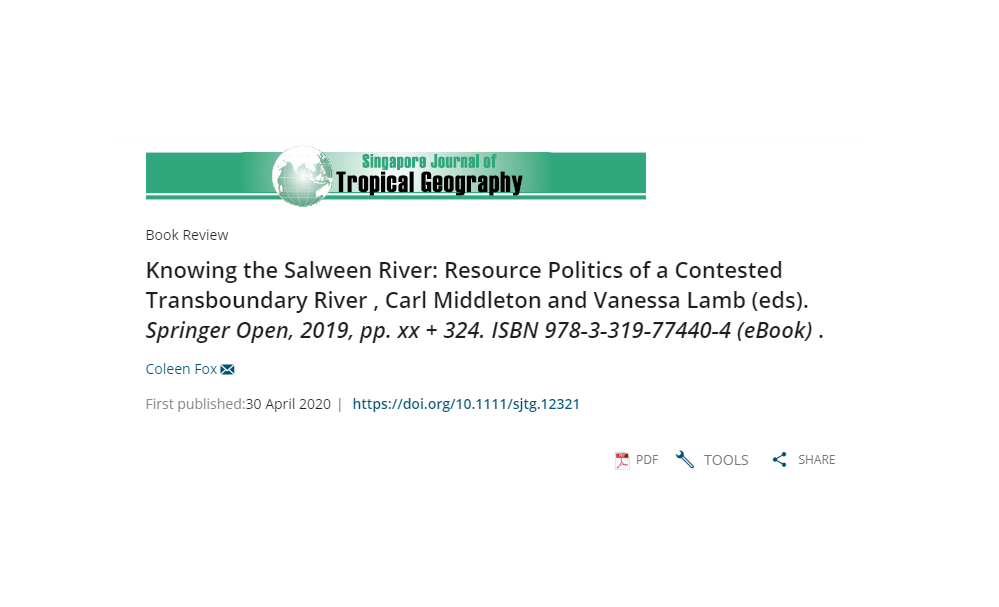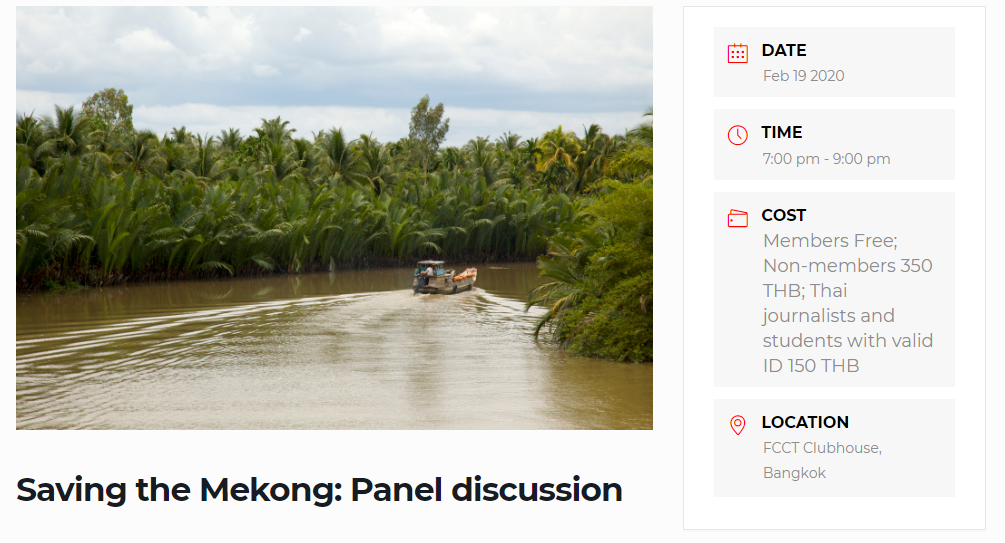List of Programs:
DAY 1: Thursday, 10 October 2019
08:30-09:00 Registration
09:00-09:30 Welcome Remarks
Prof. Dr. Pironrong Ramasoota, Vice President for Social Outreach and Global Engagement, Chulalongkorn University
H.E. Jacques Lapouge, French Ambassador to Thailand
Assoc. Prof. Dr. Ake Tangsupvattana, Dean, Faculty of Political Science, Chulalongkorn University
09:30-10:30 Keynote Speech: “Reflection on Vijñana of Religion: New Animism in the Age of the Anthropocene” by Thanes Wongyannava, Retired Professor, Faculty of Political Science, Thammasat University
Chair: Jakkrit Sangkhamanee, Faculty of Political Science, Chulalongkorn University
Stephane Rennesson, CNRS-LESC
10:30-11:00 Coffee break
11:00-12:30 Session 1
Session 1A: Particulate matters: The emergence of a political ecology of haze in Asia
Chair: Karine Léger, AirParif.
“Making an 'Indian' Air Pollution Technoscience” by Rohit Negi, Urban Studies, Ambedkar University (with Prerna Srigyan, University of California-Irvine)
“Positioning Indonesia’s Oil Palm Smallholders in the Anthropocene Debates” by Rini Yuni Astuti, Asia Research Institute, National University of Singapore (with Andrew Mc Gregor, Macquary University and David Taylor, Department of Geography, National University of Singapore )
“How to break the political barrier to act on air pollution control with open information?” by Sarath Guttikunda, urbanemission.info
“Haze crisis and upland/lowland relationships in Chiang Mai” by Olivier Evrard, French Research Institute for Sustainable Development (with Mary Mostafanezhad, University of Hawai’i at Manoa).
Session 1B: Feminist political ecology in Asia
Chairs: Bernadette P. Resurrección and Kanokwan Manorom
“Gender professionals in environment and development. Theory and praxis through feminist political ecology” by Bernadette P. Resurrección, Senior Research Fellow, Stockholm Environment Institute (SEI)
“Feminism Political Ecology and Land broker State in the Special Economic Zones (SEZs) in the Mekong: A case study of Thailand” by Kanokwan Manorom, Mekong Sub-region Social Research Center (MSSRC), Faculty of Liberal Arts, Ubon Ratchathani University
“Beyond Recognition of Adat Forest: Feminist Political Ecology and Resource Frontier on Customary Forest in Indonesia.” by Siti Maimunah, Marie Sklodowska-Currie Fellow/ WEGO-ITN, University of Passau
“Towards a Feminist Geopolitical Ecology of Environmental Change, Land Grabs, and Migration” by Sara Vigil, Research Fellow, Stockholm Environment Institute
12:30-13:30 Lunch
13:30-15:00 Session 2
Session 2A: Resource politics and the public sphere
Chair: Naruemon Thabchumpon, Faculty of Political Science, Chulalongkorn University
“Demarcating the public and private in land and environmental governance in the Mekong Region” by Philip Hirsch, School of Geosciences, University of Sydney
“The hybrid public sphere in Myanmar and implications for civil society” by Tay Zar Myo Win, Center for Social Development Studies, Faculty of Political Science, Chulalongkorn University
“A Rising Indifference To Law: environmental reporting in the age of Narendra Modi” by M. Rajshekhar, Independent journalist, Delhi.
Session 2B: Asia’s urban political ecologies
Chair: Olivier Chrétien, Head of Department Environmental Impacts Prevention, Paris Municipality
“Water Management in Bangkok and Uneven Vulnerabilities”by Niramon Serisakul, Urban Design and Development Centre (UddC) / Department of Urban and Regional Planning, Chulalongkorn University
“Managing the (sinking) City of Jakarta” by Irvan Pulungan, Coastal Committee Member, Governor's Delivery Unit, Jakarta Capital City Government
“Marginalizing policies: rethinking the modernization of the waste sector in Delhi” by Rémi de Bercegol, Center for Social Sciences and Humanities / French National Center for Scientific Research – CNRS; and Shankare Gowda, Associate to Centre for Policy Research (CPR) New Delhi (by Skype)
“Governance of seaside tourist resorts areas confronted with environmental challenges in Southeast Asia” by Christine Cabasset, French Institute on Contemporary Southeast Asia – IRASEC
15:00-15:30 Coffee break
15:30-17:00 Session 3
Session 3A: Political ecologies of land in Southeast Asia: Beyond the technical-regulatory gaze
Chair: Miles Kenney-Lazar
“The maize boom in northern Laos: Impacts on land use and access” by Robert Cole, Global Production Networks Centre and Department of Geography, National University of Singapore;and Centre for Social Development Studies, Chulalongkorn University
“The Relational Governance of Land: Contested Plantation Concessions in Laos” by Miles Kenney-Lazar, Department of Geography, National University of Singapore
“Migration and women’s land tenure rights and security in the Greater Mekong sub-region” by Soimart Rungmanee, Puey Ungphakorn School of Development Studies, Thammasat University
“Alternative Land Management in Thailand: a Case study of the Southern Peasants’ Federation of Thailand (SPFT)” by Supatsak Pobsuk, Thailand Programme Officer, Focus on the Global South
Session 3B: People and the biodiversity crisis: reshaping governance and justice in conservation
Chair: Sarah Benabou
"Indigenous Resurgence, Relational Ontologies, and the Salween Peace Park" by Robert A Farnan, The Regional Center for Social Science and Sustainable Development (RCSD), Chiang Mai University
“Putting conservation in local hands? The Khasi Hills Redd+ project” by Sarah Benabou, French National Research Institute for Sustainable Development (IRD- Patrimoines locaux, Environnement et Globalisation) and French Institute of Pondicherry (IFP)
“How many tigers are enough? The biopolitics of tiger conservation in India” by Nitin Rai, Ashoka Trust in Ecology and the Environment (ATREE), Bangalore
DAY 2: Friday, 11 October 2019
09:00-10:00 Keynote Speech: “The Political ecology of climate change, uncertainty and transformation in marginal environments” by Lyla Mehta, Institute for Development Studies, University of Sussex
Chair: Bharat Dahiya, Research Center for Integrated Sustainable Development, College of Interdisciplinary Studies, Thammasat University and Urban Youth Academy, Seoul
Discussant: Prof. Surichai Wungaeo, Center for Peace and Conflict Studies, Chulalongkorn University
10:00-10:30 Coffee break
10:30-12:00 Session 4
Session 4A: Industrialization and ecological justice
Chair: Shaun Lin, Department of Geography, National University of Singapore
“How Japan’s Aid and Investment ‘Offshore’ Flood Management to Reduce Flood Risks in Thailand” by Takeshi Ito, Faculty of Liberal Arts and Graduate School of Global Studies, Sophia University
”Political Ecology of Thailand’s Marine Plastic Pollution Crisis” by Danny Marks, Department of Asian and International Studies, City University of Hong Kong
“The failed promise of industrialization and of justice, Coromandel coast” by Senthil Babu, French Institute of Pondicherry (IFP)
“Flash points- Exploring conflict and justice issues in economic zone of Myanmar under BRI investment” by Myint Zaw, Paung Ku
Session 4B: Ontologies of infrastructure
Chair: Jakkrit Sangkhamanee
“Infrastructure in the Making: The Chao Phraya Dam and the Dance of Agency” by Jakkrit Sangkhamanee, Faculty of Political Science, Chulalongkorn University
“Aggregate Ecologies: On the environmental effects of city surfaces” by Eli Elinoff, Victoria University of Wellington
“Urban Kaleidoscopes: Chinese Construction, Scale-Making, and the Re-Design of Cambodian Cities” by Casper Bruun Jensen, Independent Researcher
“Re-defining, Re-imagining and Re-particularising Thailand's Climate Knowledge(s): The case of climate actors and their knowledge infrastructures” by Chaya Vaddhanaphuti, Department of Geography, Faculty of Social Sciences, Chiang Mai University
12:00-13:00 Lunch
13:00-14:30 Session 5
Session 5A: Hydrosocial rivers and their politics
Chair: Kenji Otsuka, Interdisciplinary Studies Center, Institute of Developing Economies
“Ontological politics of hydrosocial territories in the Salween River basin, Myanmar/Burma” by Carl Middleton (with Johanna Gotz), Center for Social Development Studies, Faculty of Political Science, Chulalongkorn University
“Politics of urban riverbank development: the contested Chao Phraya River Promenade project in Bangkok” by Thanawat Bremard, G-EAU (Water Management, Actors, Territories), Montpellier/ IRD (French Research Institute for Development), France
“Flows, fragments and futures: Rethinking biophysical geopolitics in the Lower Mekong wetlands and Tonle Sap” by Carl Grundy-Warr, Department of Geography, National University of Singapore
“Rewilding the commons: Community Led Restoration in the Penna River Basin” by Siddharth Rao, Adavi Trust, and Timbaktu Collective, Andhra Pradesh, India.
Session 5B: Representations of nature and political engagements
Chair: Frédéric Landy, French Institute of Pondicherry, University of Paris-Nanterre/LAVUE
“Nature reshaped: Diffracted political engagements for recovering grabbed land in Cambodia” by Frédéric Bourdier, CNRS, UMR DEVSOC, IRD/University of Paris 1 Pantheon-Sorbonne
“Politics of water management in the Koshi plain (Nepal and North India) : Modern economics versus extreme environmental factors” by Marie-Amélie Candau, Post-doc, University of Paris Nanterre/LAVUE
“Nature and Human in Sino-Vietnamese conceptions and practices. Articulations between Asian vernacular ‘analogism’ and Western modern ‘naturalism’ modes of identification” by Christian Culas, CNRS, ART-DEV Institute
14:30-15:00 Coffee break
15:00-ุ16:30 Session 6
Session 6A: Interspecies cohabitations in Asia: Non-human animals and political ecology
Chair: Olivier Evrard
“Lizards and other Ancestors: wildlife conservation and the moral ecology of Komodo” by Annette Hornbacher, Institute for Ethnology, Heidelberg University
“Modern Nomadism among Thai Mahouts: a social consequence of human - elephant relations evolution in Thailand’s tourism industry” by Wasan Panyagaew, Sociology and Anthropology Faculty, Chiang Mai University
“Are some managers of Indian national parks corrupted or analogist? Relationships to nature and wildlife in Hindu India” by Frédéric Landy, French Institute of Pondicherry (IFP)/LAVUE
“The coproduction of ecologies with more than human animals: playing with beetles, birds and fish in Thailand” by Stephane Rennesson, Centre National de la Recherche Scientifique (CNRS)/French National Centre for Scientific Research, IRASEC Department
Session 6B: Post-development and systemic alternatives from Asia (round table)
Chair: Carl Middleton, Center for Social Development Studies, Faculty of Political Science, Chulalongkorn University.
Kyaw Thu, Paung Ku
K.J. Joy, Society for Promoting Participative Ecosystem Management (SOPPECOM)
Suphakit Nuntavorakarn, Healthy Public Policy Foundation (HPPF)
Wora Sukraroek, EarthRights International and Member of Thailand Extraterritorial Obligations Watch Coalition
16:30-17:00 Concluding Remarks
To register for this forum, please e-mail us your name, organisation, and position to Anisa Widyasari (CSDS) at PoliticalEcologyinAsia@gmail.com. Registering participants are requested to pay 400 THB per day for lunch and coffee breaks. Students may join for free.
FULLY BOOKED - REGISTRATION IS NOW CLOSED






















